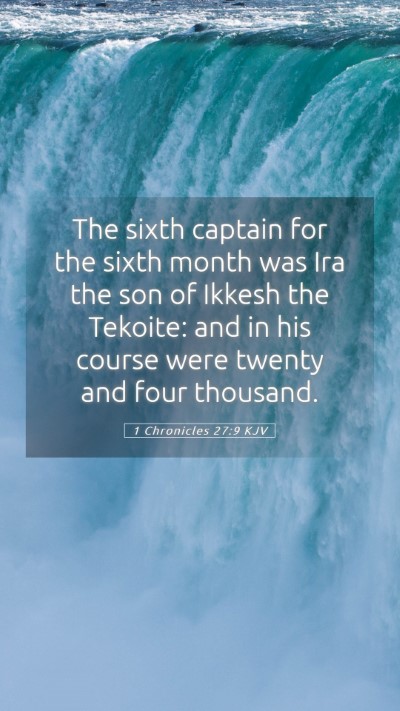Bible Verse Meaning: 1 Chronicles 27:9
Verse Reference: 1 Chronicles 27:9 - "The sixth captain for the sixth month was Ira the son of Ikkesh the Tekoite: and in his course were twenty and four thousand."
Overview of 1 Chronicles 27:9
This verse is part of a larger passage that lists the leaders of the military divisions of Israel. It mentions the sixth captain for the sixth month, Ira the son of Ikkesh from Tekoah, who commanded a group of 24,000 men. Such lists serve a significant purpose in establishing order and accountability within the Israelite community during King David’s reign.
Insights from Public Domain Commentaries
-
Matthew Henry's Commentary
Henry emphasizes the organizational structure of David's kingdom, hinting at the sense of duty and responsibility that each captain held. The specific mention of Ira signifies the importance of proper leadership in military affairs.
-
Albert Barnes’ Notes
Barnes notes that the record of military leaders not only highlights David's strategic planning but also reflects a divine order in the appointment of these leaders. The inclusion of geographical origins of these commanders indicates their loyalty to the king and establishes a sense of unity among the tribes of Israel.
-
Adam Clarke’s Commentary
Clarke adds to the discussion the character of Ira, suggesting that being named in such a list indicates his valor and devotion to King David. The mention of the number of men he commanded showcases the military strength and readiness of Israel during that period.
Interpretations and Understanding
This verse can be understood within the larger context of David's reign, where military organization was crucial for maintaining peace and security in Israel. By establishing divisions led by capable leaders, David ensured that each month of the year had efficient military oversight, showcasing his commitment to the safety of his kingdom.
Historical Context
In the historical context of ancient Israel, military strategy was paramount. The Israelites faced various external threats, and well-structured divisions were critical for responding to these challenges. This verse reflects a time of preparation and vigilance under David’s leadership.
Theological Implications
The appointment of military leaders as depicted in this verse not only emphasizes the need for organization but also signifies God's providence in providing leaders in critical times. This can lead to deeper reflection on God’s choice of leadership within the church and community.
Application in Today's Context
For modern readers, 1 Chronicles 27:9 serves as a reminder of the importance of structure and accountability in any organization, be it a church, community, or family. The emphasis on solid leadership encourages individuals to seek and support those in positions of authority while also being mindful of their roles.
Cross References
- 1 Chronicles 12:27-28 - Discusses the warriors who came to David's aid.
- 2 Samuel 23:8-39 - Lists the mighty men of David and their exploits.
- 1 Chronicles 18:14 - Chronicles David's reign and administration.
Conclusion
Understanding 1 Chronicles 27:9 involves both a comprehension of historical military organization and an appreciation for the biblical themes of leadership and responsibility. As readers, we gain insights into how scripture encourages structured authority and the significance placed on God’s providential guidance in our lives today.


